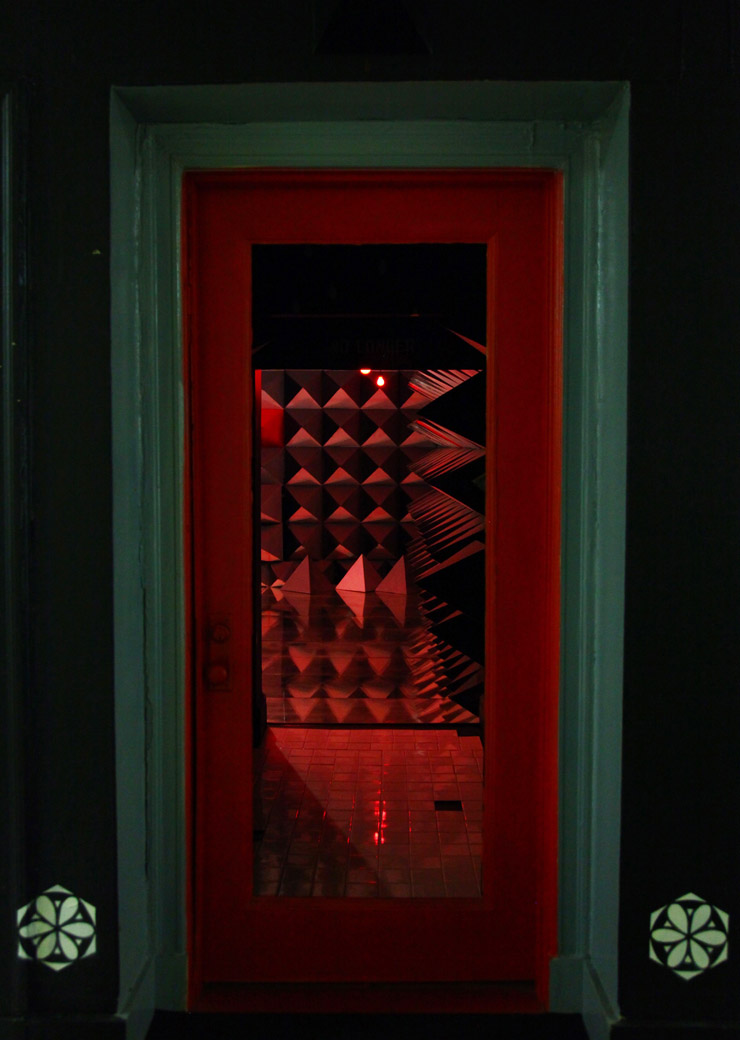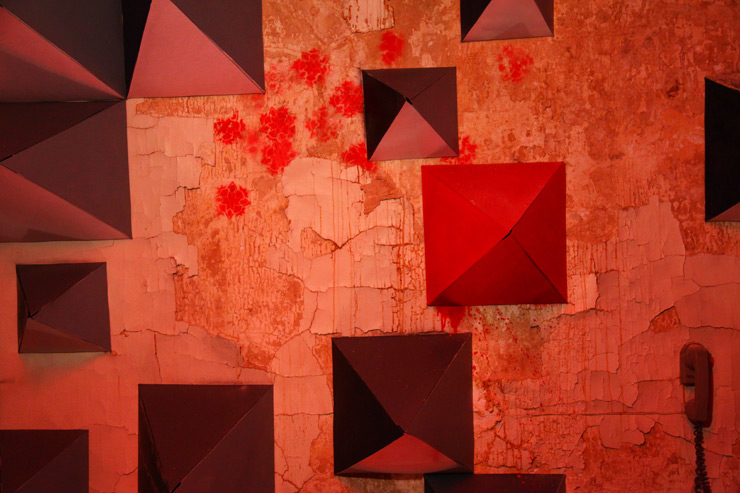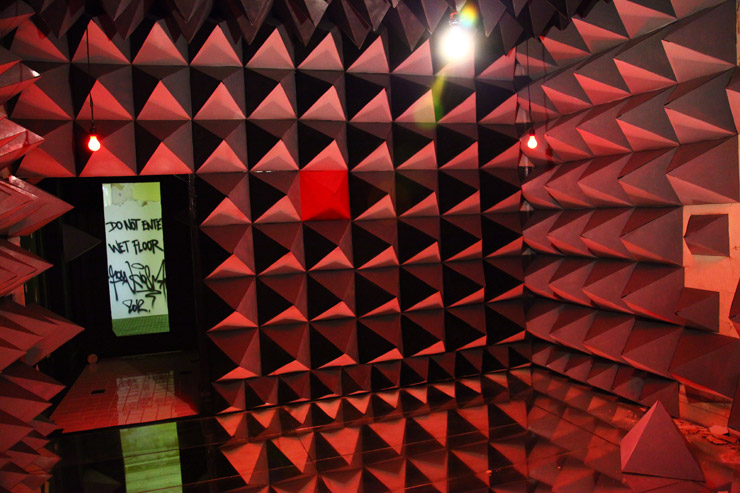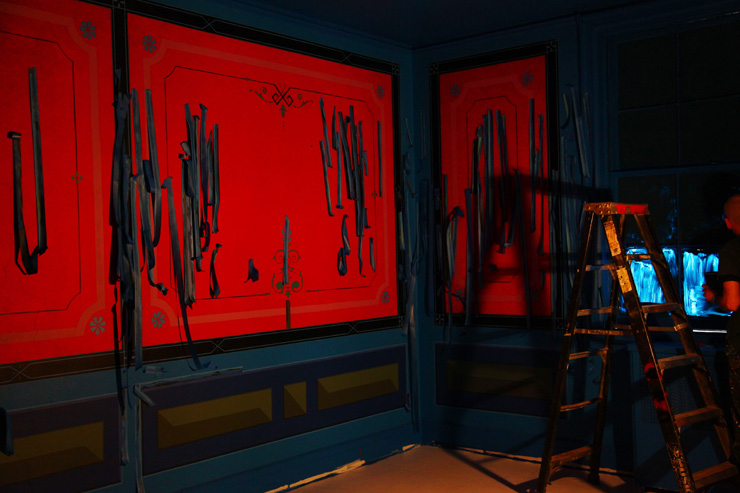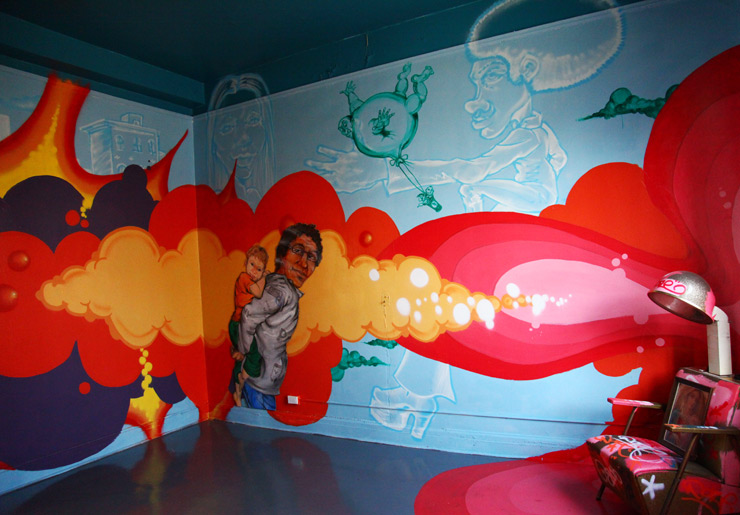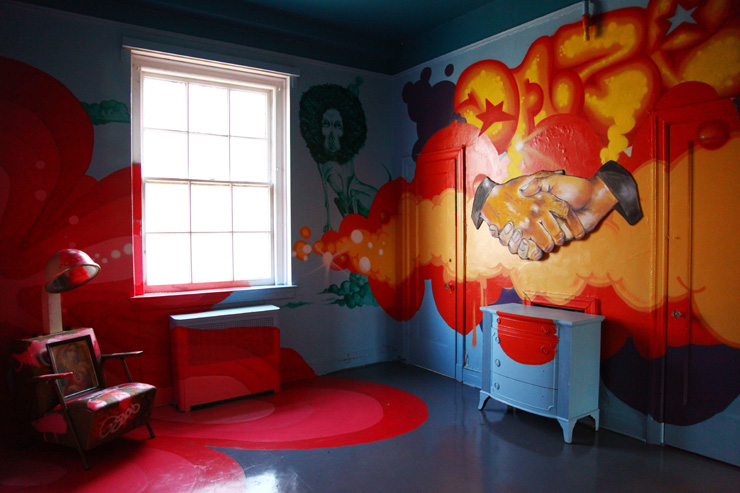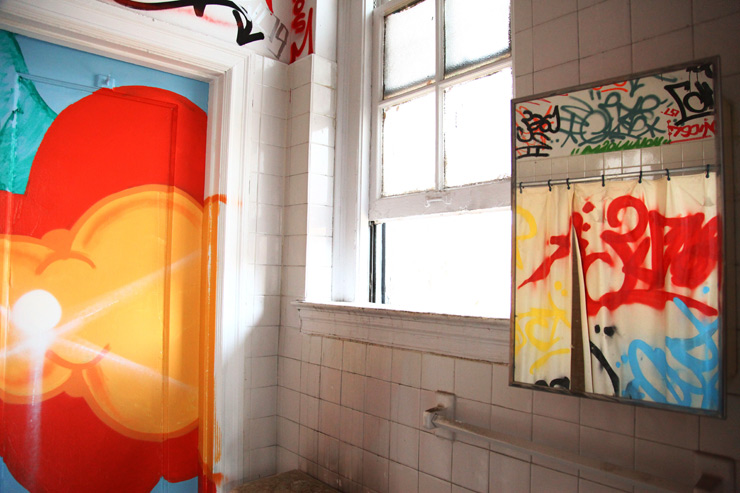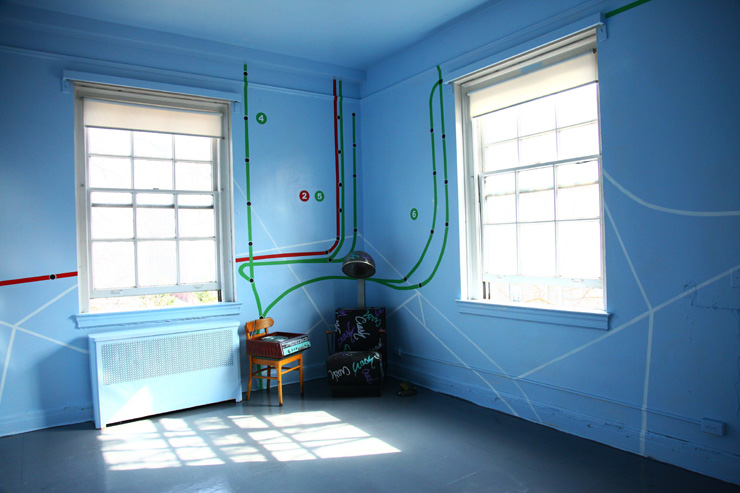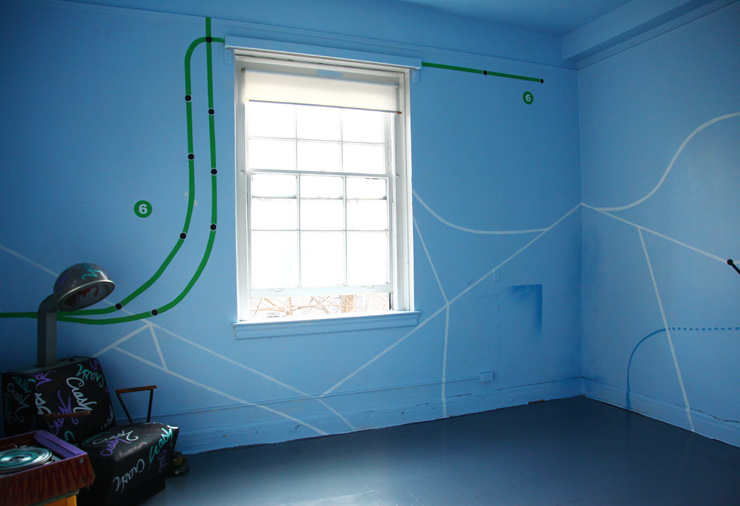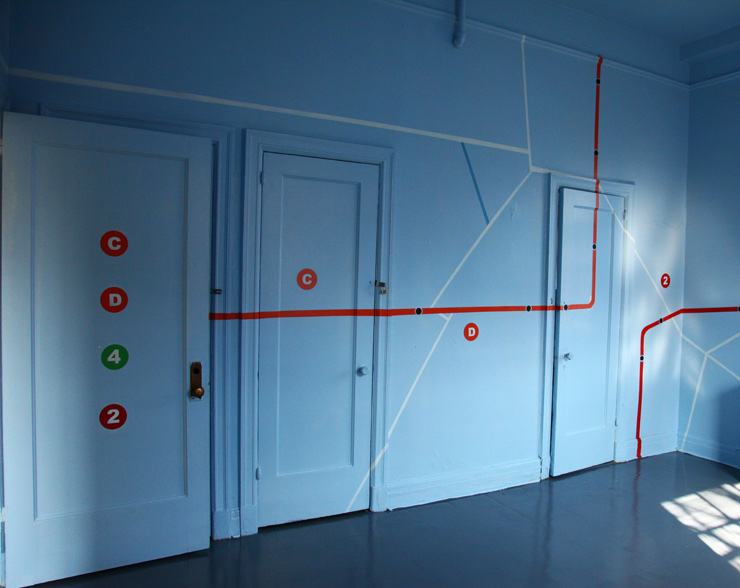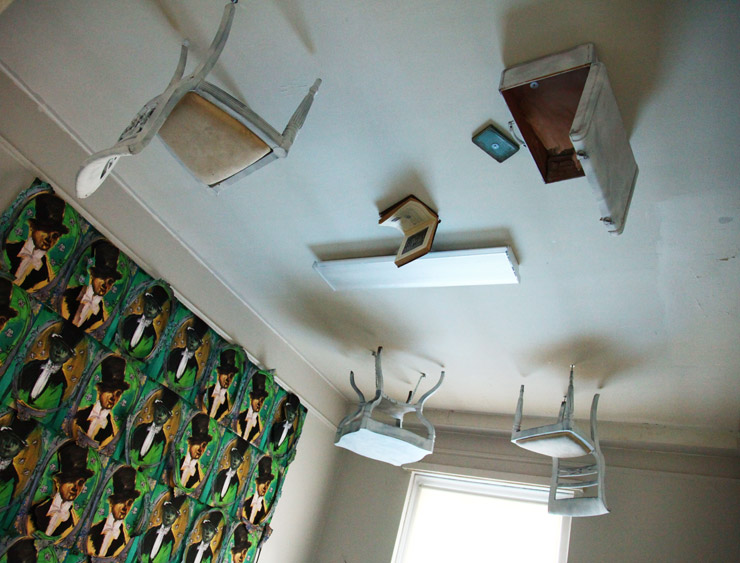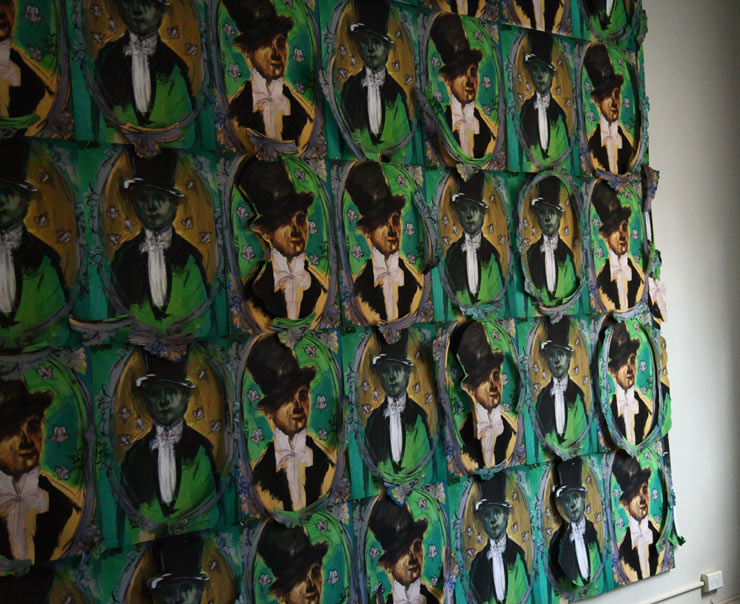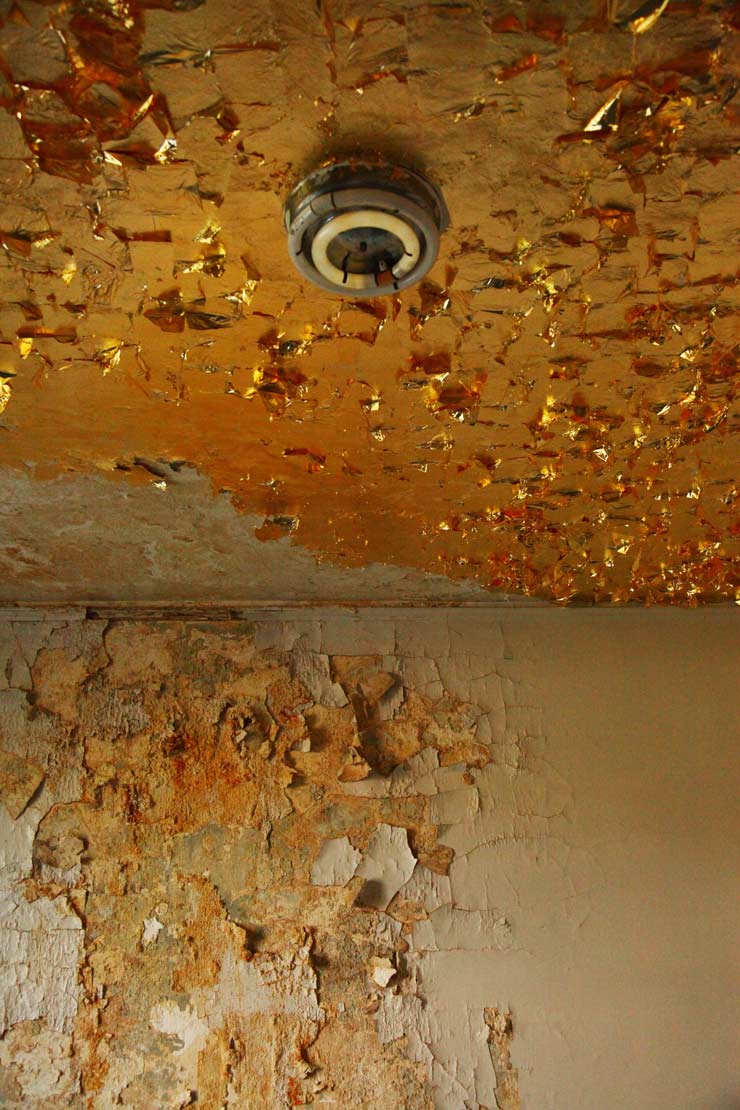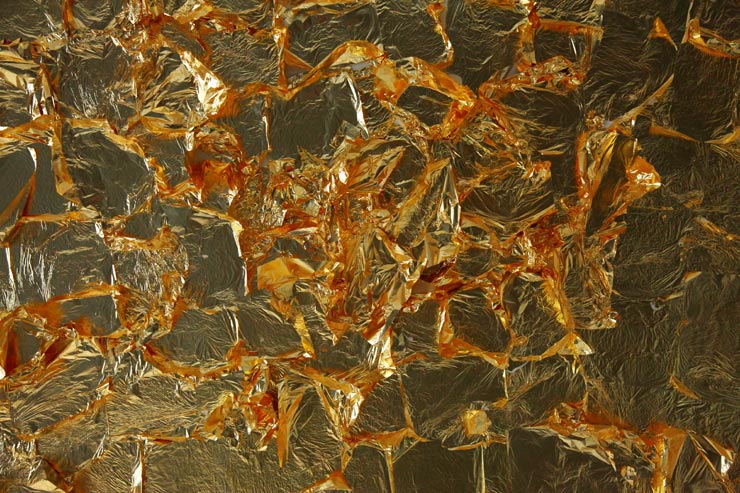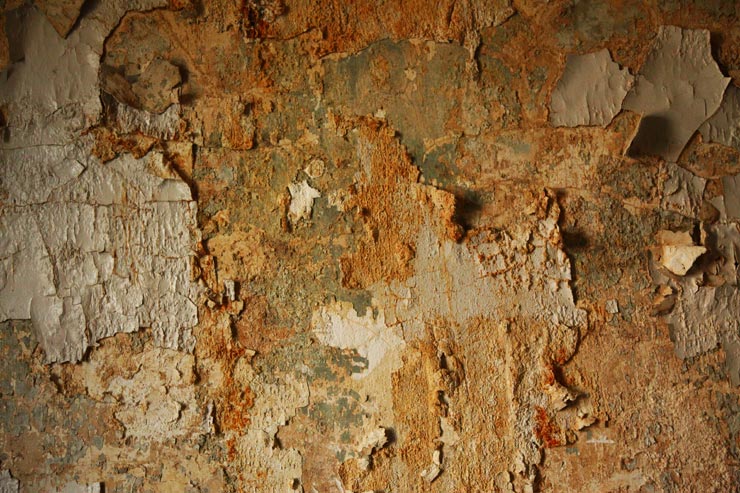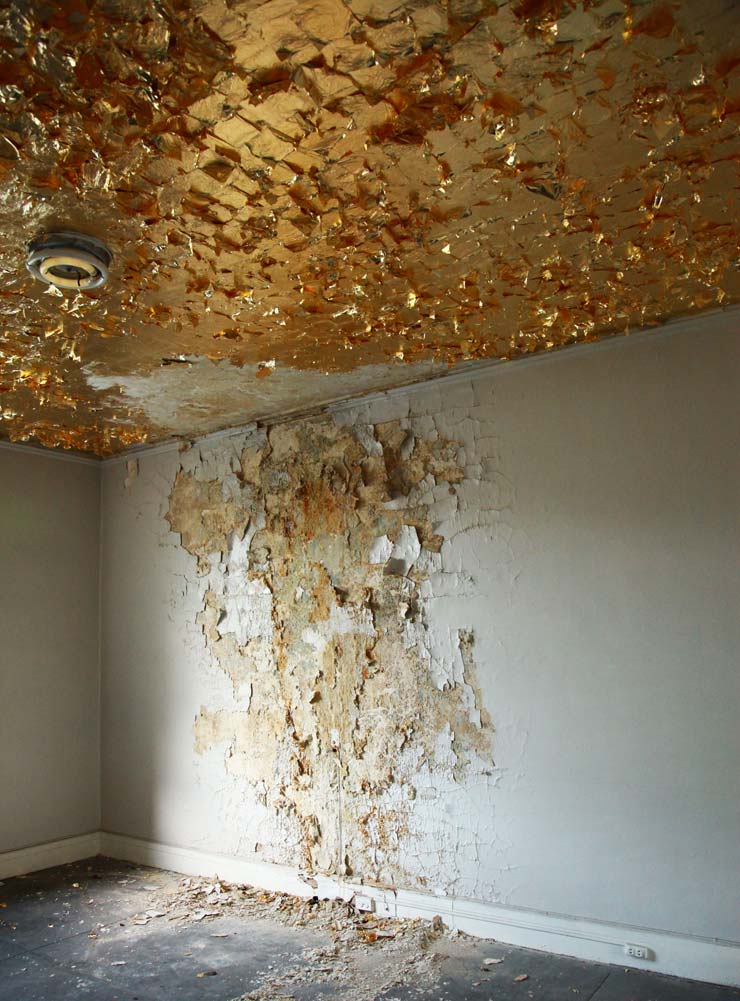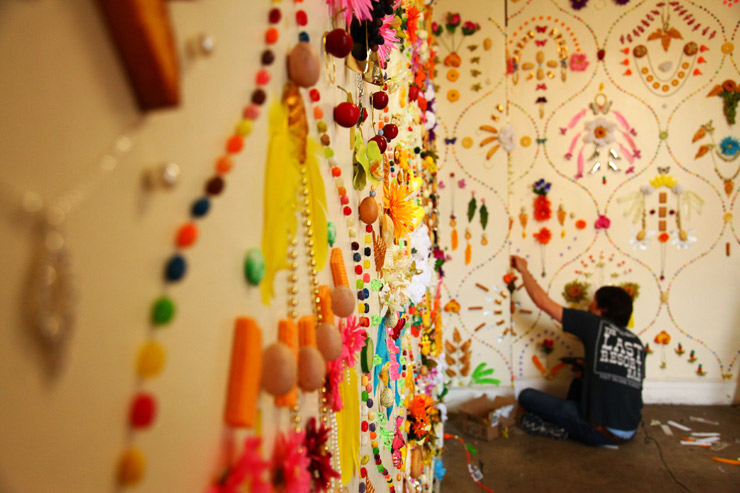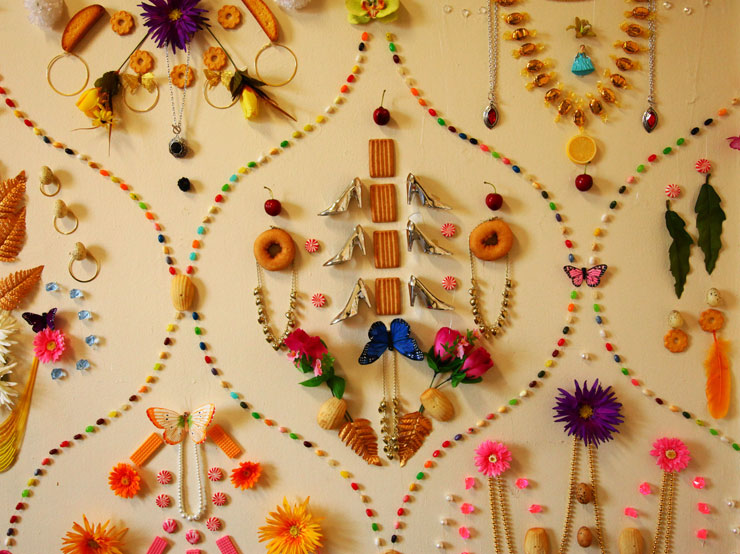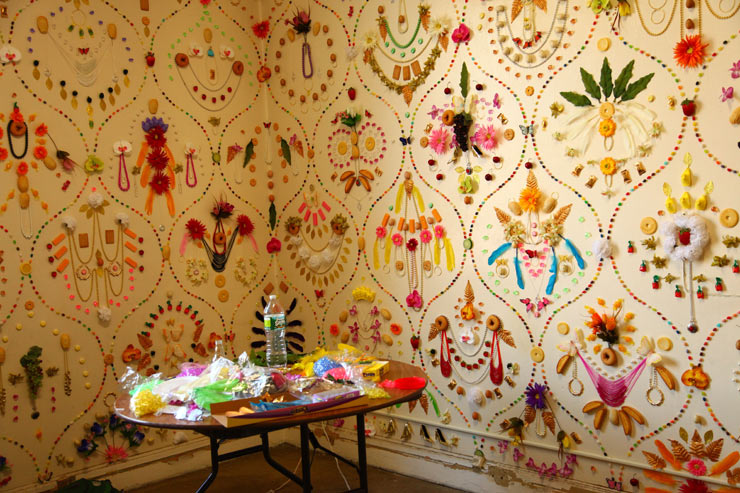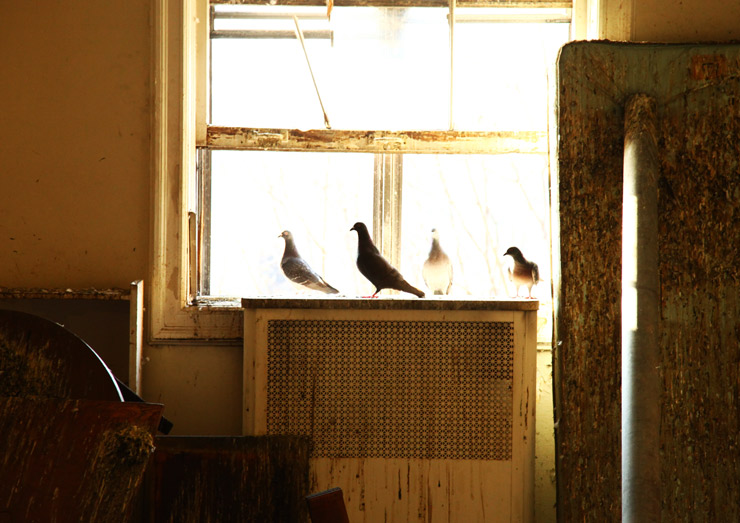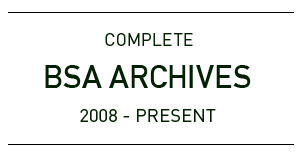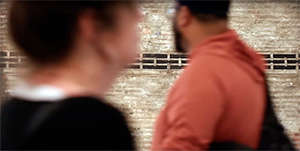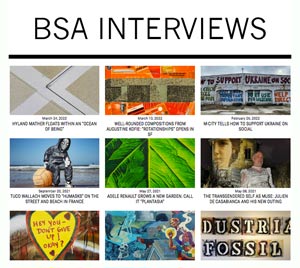A block-long limestone mansion originally built as a welfare hotel for the retiring rich invites streetwise Graff artists and others to gild it’s decayed rooms, raising it from pigeon-infested squalor. Call it “This Side of Paradise”
Enter a discussion about the impact of the modern Street Art movement and someone will inveigh with swollen gravitas that Street Art has the power to “activate” or “re-vitalize” a previously moribund space, to bring it to life. Aside from sounding like part of the gentrification process, the “activate” argument is meant to tip on its head the impulse of simple-minded dullards who opine that Street Art and it’s cousin graffiti are pure social disease and degrading to the foundations of city life.
How and Nosm “Reflections” (photo © Jaime Rojo)
Opening in April in the Bronx a similarly anti-intuitive project invites artists of the street to create new life in a decaying mansion and the looking-glass contradictions are as rich as those of the benefactor for whom the aged home is named. The Andrew Freedman Home, with it’s Italian Renaissance details and stepped back grandeur along the Grand Concourse and a mile south of Yankee Stadium, acquired its landmark status in 1984 – the same year it breathed it’s final breath as a retirement home for the rich who had fallen on hard times.
When the building’s namesake, a New York millionaire businessman and colleague of the corrupt Tammany Hall, died as a confirmed bachelor in 1915, he wanted to make sure the money he left would keep the wealthy feeling wealthy after falling in the poorhouse. He simply didn’t want his peers to suffer no matter their financial plight so his wealth commissioned this mammoth home with roughly twice the space of the White House to give these deserved folk a good life in their later years, with servants. Beginning in the Roaring Twenties and over the next six decades, with hallways as long as 22 Town Cars, the ground-bound ship liner swam with former Cunard attendants serving the mostly white seniors as they dined in red and black Chinoiserie style, thumbed books in the library, played sport in the billiard room, and bobbed in the grand ballroom.
How and Nosm “Reflections” (photo © Jaime Rojo)
How and Nosm “Reflections” (photo © Jaime Rojo)
“I think that you cannot help but be struck by the bizarre nature of the enterprise because it was class solidarity. He was less concerned with the indigent poor than protecting his own class who had fallen on hard times,” exclaims Manon Slome as she frames the ridiculous circumstances that kept “members” well heeled into their twilight.
Slome is President and Chief Curator of No Longer Empty, a contemporary public art organization that takes empty buildings that are often in disrepair and revitalizes them with site-responsive contemporary art exhibitions. Together with the Mid Bronx Senior Citizens Council, the non-profit that has owned the 117,000 square foot complex since 1984, No Longer Empty is curating a 32 artist show that for two months will offer curious visitors the first peek at the decrepitude that is slowly being enlivened. Since bidding farewell to their last upper crust in the early 1980s, the crusty decay of walls and ceilings has been curling and peeling and dropping to the floor. With artists interpreting the history and memories of the place along with their own take on the economics involved, the results are definitely site specific.
How and Nosm “Reflections” (photo © Jaime Rojo)
How and Nosm “Reflections” (photo © Jaime Rojo)
As she talks about the new show “This Side of Paradise,” Jeanette Puryear, Executive Director of Mid Bronx Senior Citizens Council, reflects on how she used to watch the games and social activities in the grassy gardens of the home from the other side. “We began across the street when the council started in 1973. I came aboard as a staff person in ’77 and I used to look down on the parties that they had on the lawn here. I just thought it was a wonderful building.”
Discussing the selection of No Longer Empty (NLE) as partner to the arts community and curator of the new show, Puryear feels like it is a natural accord. “The idea, our collaboration, really came about when I met Manon and she talked about NLE’s interest in revitalizing communities and it really fit very much with our mission of comprehensive community revitalization.”
Justen Ladda. “Like Money, Like Water”. Eventually this installation in progress would be black lit. The blue tape affixed to the walls is to economize and will not be a part of the installation. (photo © Jaime Rojo)
Daze (photo © Jaime Rojo)
This may come as news to some that graffiti kings like Crash and Daze were called upon to do community revitalization in the same borough where leaders once reviled their painting style. With a few heavyweight street art and graffiti names bringing these rooms to life, it’s interesting to see their role as one of contributing in a positive way here where the emergence of a global “Wildstyle” graffiti first blossomed while entire neighborhoods burned.
“At the same time in the late 70s and early 80s when this home’s original purpose was failing you had the rise of Bronx graffiti,” says curator Keith Schweitzer, who introduced Crash, Daze and Tats Cru alumni How & Nosm to Slome, each taking one of the rooms and bringing it to life. Schweitzer sees many parallels in this Bronx tale as he reflects on the role of the artist rising from the ashes of the burned-out neighborhoods then and an art show in the decay of this home now. “At that time you had things like Fashion Moda in the Bronx, which sort of incorporated graffiti into a contemporary art exhibition and these conceptual spaces that Street Artists and Graffiti artists participated in. And it all happened at the same time.”
Daze (photo © Jaime Rojo)
Daze (photo © Jaime Rojo)
Slone brings the stories full circle as she excitedly relates the multiple arts and education projects currently afoot in the home, including many with a social mission of building community and connections within it. “When we started selecting and inviting the artists, we steeped them in the history of the home. The goal was really to create a fusion of the history of the home and the nature of the history of the Grand Concourse and the present day realities of the Bronx. And that fusion was really the creative springboard, if you like, for most of installations in the exhibition.”
Whatever role you assign the artist in this clubby home of decay, the experience of discovering these complete room installations is at times reflective, sometimes illuminative, and often revitalizing to the spirit. It will depend on the definition of paradise.
Crash “Connections” 2012. (photo © Jaime Rojo)
Crash “Connections” 2012. (photo © Jaime Rojo)
Crash “Connections” 2012. (photo © Jaime Rojo)
Scherezaede Garcia. (photo © Jaime Rojo)
Scherezaede Garcia. (photo © Jaime Rojo)
Cheryl Pope “Then and There” Installation in progress. (photo © Jaime Rojo)
Cheryl Pope “Then and There” Installation in progress. (photo © Jaime Rojo)
Cheryl Pope “Then and There” Installation in progress. (photo © Jaime Rojo)
Cheryl Pope “Then and There” Installation in progress. (photo © Jaime Rojo)
Adam Parker Smith. “I Lost All My Money In The Great Depression And All I Got Was This Room”, 2012. Installation in progress in collaboration with Wave Hill. (photo © Jaime Rojo)
Adam Parker Smith. “I Lost All My Money In The Great Depression And All I Got Was This Room”, 2012. Installation in progress in collaboration with Wave Hill. (photo © Jaime Rojo)
Adam Parker Smith. “I Lost All My Money In The Great Depression And All I Got Was This Room”, 2012. Installation in progress in collaboration with Wave Hill. (photo © Jaime Rojo)
Untitled. Pigeons took over while most of the house remained close and unused. (photo © Jaime Rojo)
BSA>>><<<<BSA>>><<<<BSA>>><<<<BSA>>><<<<BSA>>><<<<BSA>>><<<<
This Side of Paradise will open on April 04 at 6:00 pm. For further details about this exhibition click here.
With special thanks to President and Chief Curator Manon Slome and Curator Keith Schweitzer of No Longer Empty for their generous access to the installations in progress. To learn more about No Longer Empty click here.
BSA would also like to extend our gratitude to Jeanette Puryear, Executive Director of Mid-Bronx Council for taking time to answer our questions. To learn more about Mid-Bronx Council click here.
Other Articles You May Like from BSA:
Ad DeVille from Skewville collaborates with Chris Stain and Logan Hicks The India Street Mural Project is the inaugural project by a new public art group called North Brooklyn Public Art Coalition (N...
Summer brings people out onto the streets. New Yorkers especially love to congregate on corners, stoops, public parks and plazas, sidewalks and on the streets to soak in the sun and the excitement of ...
If the popular response to this poster campaign is an indication, there will be many in the streets. The “We the People” project with Street Artist and activist Shepard Fairey, Ernesto Yerena and Jes...
We start this weeks images of the week with a postering campaign by nice, friendly, educated photo-journalists who illegally put up wheatpastes of their artistry this week in many parts of the c...
Our weekly focus is on the moving image and art in the streets. And other oddities. Now screening:1. Edoardo Tresoldi Studio Visit 2. Homemade Security Patrol Robot by Handy Geng.First-Cent...
 BROOKLYN STREET ART LOVES YOU MORE EVERY DAY
BROOKLYN STREET ART LOVES YOU MORE EVERY DAY